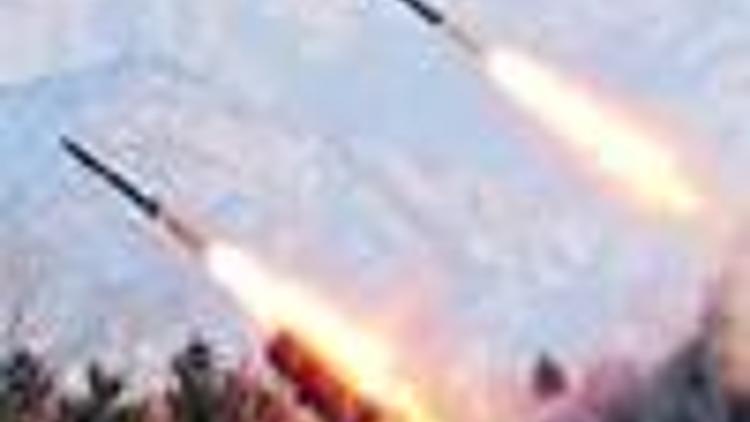Shockwaves spread on Korea’s nuke test
Güncelleme Tarihi:

The Associated Press
Oluşturulma Tarihi: Mayıs 26, 2009 00:00
SEOUL, South Korea - North Korea defiantly declared it carried out a powerful underground nuclear test yesterday much larger than one conducted in 2006, angering enemies and allies alike and prompting U.N. Security Council members to call an emergency session.
The hard-line state also test fired three short-range, ground-to-air missiles from the same northeastern site where it launched a rocket last month, South Korea’s Yonhap news agency reported, citing unnamed sources. The rocket liftoff, widely believed to be a cover for a test of its long-range missile technology, drew censure from the U.N. Security Council.
Russia's Defense Ministry confirmed an atomic explosion at 9:54 a.m. (00:54 GMT) in northeastern North Korea, estimating the blast's yield at 10 to 20 kilotons Ğ comparable to the bombs that flattened Hiroshima and Nagasaki.
U.S. President Barack Obama led the international condemnation, saying yesterday that the test should be "a matter of grave concern to all nations" and accused Pyongyang of recklessness.
Other nations, including Pyongyang’s allies, Russia and China, expressed their concerns over the nuclear test as South Korea put its military on alert and the U.N. Security Council called an emergency meeting to discuss the blast.
The country's official Korean Central News Agency said the regime "successfully conducted one more underground nuclear test on May 25 as part of measures to bolster its nuclear deterrent for self-defense."
"The current nuclear test was safely conducted on a new higher level in terms of its explosive power and technology," Agence France-Presse quoted the statement as saying. North Korea's bold defiance raises the stakes in the standoff over its nuclear program. In the past two months, Pyongyang has launched a rocket despite international calls for restraint, abandoned international nuclear negotiations, restarted its nuclear plants, and warned it would carry out the atomic test as well as long-range missile tests.
The rise in tensions comes amid questions about who will succeed impoverished North Korea's authoritarian leader, 67-year-old Kim Jong II, who is believed to have suffered a stroke last August. "This is a political act more than a military act," Jim Walsh, an international security expert at the Massachusetts Institute of Technology, told the Associated Press. He said domestic factors related to North Korea's political transition were likely the main factor.
Obama called North Korea’s moves "blatant defiance" of the Security Council and a violation of international law that would only further isolate Pyongyang. "Such provocations will only serve to deepen North Korea's isolation. It will not find international acceptance unless it abandons its pursuit of weapons of mass destruction and their means of delivery," he said.
The foreign ministry in China, the North's most important ally, said it was "resolutely opposed" to the test. "China strongly demands that North Korea keeps its promise of denuclearization and ceases all actions that could further worsen the situation," it said a statement. Russia's foreign ministry said the test threatened regional stability, violated the Security Council's will and impeded nonproliferation efforts.
Japan and Europe condemned the tests as a violation of U.N. resolutions, as France called on the Security Council to impose tough new sanctions against Pyongyang. The spokesman of South Korea's President Lee Myung-Bak said the test posed a "grave challenge" to international nonproliferation efforts.
Russia's Defense Ministry confirmed an atomic explosion at 9:54 a.m. (00:54 GMT) in northeastern North Korea, estimating the blast's yield at 10 to 20 kilotons Ğ comparable to the bombs that flattened Hiroshima and Nagasaki.
U.S. President Barack Obama led the international condemnation, saying yesterday that the test should be "a matter of grave concern to all nations" and accused Pyongyang of recklessness.
Other nations, including Pyongyang’s allies, Russia and China, expressed their concerns over the nuclear test as South Korea put its military on alert and the U.N. Security Council called an emergency meeting to discuss the blast.
The country's official Korean Central News Agency said the regime "successfully conducted one more underground nuclear test on May 25 as part of measures to bolster its nuclear deterrent for self-defense."
"The current nuclear test was safely conducted on a new higher level in terms of its explosive power and technology," Agence France-Presse quoted the statement as saying. North Korea's bold defiance raises the stakes in the standoff over its nuclear program. In the past two months, Pyongyang has launched a rocket despite international calls for restraint, abandoned international nuclear negotiations, restarted its nuclear plants, and warned it would carry out the atomic test as well as long-range missile tests.
The rise in tensions comes amid questions about who will succeed impoverished North Korea's authoritarian leader, 67-year-old Kim Jong II, who is believed to have suffered a stroke last August. "This is a political act more than a military act," Jim Walsh, an international security expert at the Massachusetts Institute of Technology, told the Associated Press. He said domestic factors related to North Korea's political transition were likely the main factor.
Obama called North Korea’s moves "blatant defiance" of the Security Council and a violation of international law that would only further isolate Pyongyang. "Such provocations will only serve to deepen North Korea's isolation. It will not find international acceptance unless it abandons its pursuit of weapons of mass destruction and their means of delivery," he said.
The foreign ministry in China, the North's most important ally, said it was "resolutely opposed" to the test. "China strongly demands that North Korea keeps its promise of denuclearization and ceases all actions that could further worsen the situation," it said a statement. Russia's foreign ministry said the test threatened regional stability, violated the Security Council's will and impeded nonproliferation efforts.
Japan and Europe condemned the tests as a violation of U.N. resolutions, as France called on the Security Council to impose tough new sanctions against Pyongyang. The spokesman of South Korea's President Lee Myung-Bak said the test posed a "grave challenge" to international nonproliferation efforts.

